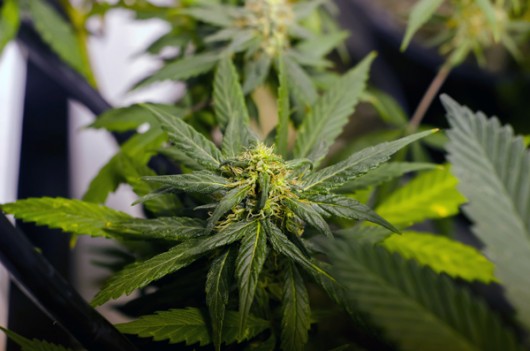The Ad Hoc Marijuana Advisory Committee was updated on proposed state regulations of commercial pot sales and discussed zoning at its meeting Wednesday afternoon. The committee is made of up representatives from the Ketchikan Gateway Borough Assembly, the Ketchikan City Council, the Saxman City Council and the Ketchikan School Board.
Planning Director Chris French gave an update to the committee. He says he spoke with staff from the Alaska Alcohol Beverage Control Board who are drafting the regulations. He says restriction on the number of plants allowed is still unclear.
French says the regulations will probably include requirements prohibiting commercial sales, manufacturing and testing of marijuana products a certain distance from residential zones, schools and other public areas. He says it’s uncertain what those distances might be and if too restrictive, could prohibit pot sales in small communities.
French provided zoning maps and preliminary information on where commercial marijuana facilities could be located in the Ketchikan area under current code. There are four types of commercial operations: cultivation, manufacturing, testing and retail sales.
“The closest use that we would have in the code on a marijuana cultivation facility is agricultural use which would currently be allowed in the future development zone, and de facto allowed in the heavy industrial zone. For marijuana product manufacturing facilities, those would be in your light and heavy industrial zones. Marijuana retail stores would be in your commercial and also industrial zones. A marijuana testing facility which would be similar to a lab facility would be allowed in commercial and industrial zones.”
Assembly member Glenn Thompson asked French if local municipalities can fully ban or partially ban operations. French says based on his discussions with ABC board members, some bans are possible.
“All the businesses, whether it be cultivation facilities or retail, you could ban just one of those types of businesses. A municipality would be able to do that. That could be done through ballot measure or it could be done by ordinance. You could say, ‘I don’t want any grow operations in the City of Saxman.’ They could propose an ordinance to just eliminate that use and not the others. Or maybe they don’t want retail operations, they can ban just retail operations. So, you can do a partial ban on the businesses and the types of businesses that are allowed in your community or an overall ban.”
French says he reviewed regulations in place in several communities in Washington State and Colorado, and some standards are required as a condition of getting an operating permit. He says the Borough Zoning Code already has a provision called “permitted with standards.”
“This is permitted in this zone if you meet these standards. These standards could be – needs to be within a building, needs to be set back from residential area a certain distance, if it’s a grow operation there could be ventilation requirement. Those kind of things can all be part of that. If we want to look at it from a zoning standpoint, probably look at it as maybe a ‘permitted with standards’ type use and then develop what standards the community wants to put in place. Whether it’s setbacks from certain uses or hours of operations. All these different things could be established for them and would require that those standards be met for that use to be permitted.”
During a status report on actions taken by elected bodies, Saxman Mayor Silvia Banie says the Saxman City Council has been discussing a partial ban, but no decision has been made. Thompson says the Borough Assembly is gathering more information, and Ketchikan City Council Member Bob Sivertsen says that council is waiting to see what is finalized by the state.
City Council Member KJ Harris earlier in the meeting said allowing commercial sales would generate revenue.
“People that don’t associate with marijuana, or cannabis if we want to use it correctly, they don’t deal with it or talk about it, they don’t know there’s so much money out there. There are so many people who spend five dollars, 10, 20, 30, 50 and we want a percentage of all of that. So I’m just reminding there is money, I guarantee.”
At the end of the meeting, Thompson announced that he submitted his name for consideration to serve on the Governor’s Marijuana Advisory Board.
The next Ad Hoc Marijuana Advisory Committee meeting is Monday June 22nd. The committee decided to meet once a month unless the state makes more progress in developing and finalizing proposed regulations.







